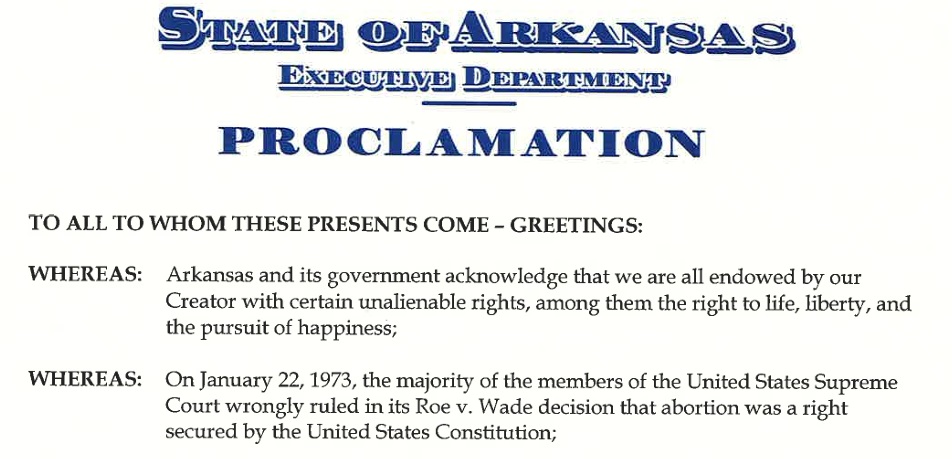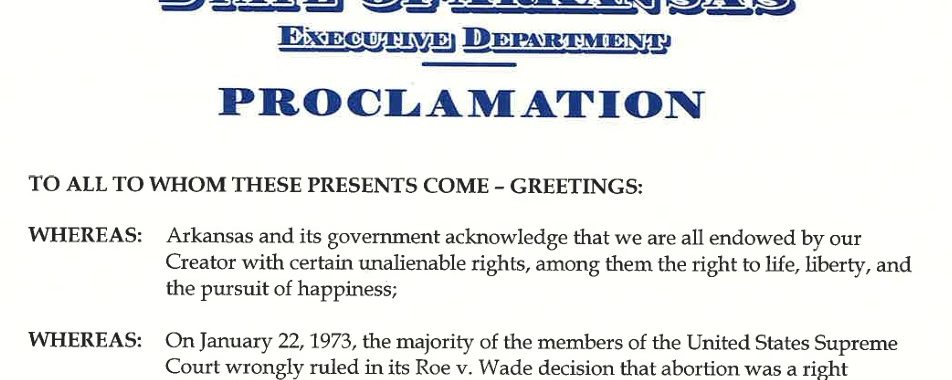Gov. Sarah Huckabee Sanders Declares January 22 ‘Day of Tears’ in Arkansas

Last week Arkansas Governor Sarah Huckabee Sanders issued a proclamation designating January 22, 2025, as the “Day of Tears.”
In 2021 the Arkansas General Assembly passed H.C.R. 1007 recognizing January 22 — the anniversary of the U.S. Supreme Court’s infamous Roe v. Wade abortion decision — as The Day of Tears in Arkansas and encouraging Arkansans to lower their flags to half-staff every year on January 22.
Even though Roe v. Wade has been overturned and abortion is prohibited in Arkansas except to save the life of the mother, it is good to set aside time to reflect on how abortion took the lives of women and unborn children for so many decades — and how many lives it still takes in America today.
Gov. Sanders’ proclamation says:
TO ALL TO WHOM THESE PRESENTS COME – GREETINGS:
WHEREAS: Arkansas and its government acknowledge that we are all endowed by our Creator with certain unalienable rights, among them the right to life, liberty, and the pursuit of happiness;
WHEREAS: On January 22,1973, the majority of the members of the United States Supreme Court wrongly ruled in its Roe v. Wade decision that abortion was a right secured by the United States Constitution;
WHEREAS: Before the United States Supreme Court decision of Roe v. Wade, Arkansas had already enacted laws protecting women and unborn children from abortion;
WHEREAS: From January 22, 1973, to June 24, 2022, the United States Supreme Court decision in Roe v. Wade prevented Arkansas from protecting women and unborn children from abortion;
WHEREAS: In Act 310 of 2023 the 94th General Assembly estimated that during that time at least two hundred thirty-six thousand, two hundred forty-three (236,243) elective abortions occurred in this State, jeopardizing the health and safety of pregnant women and depriving these unborn children of their respective rights to life, liberty, and the pursuit of happiness; and
WHEREAS: The Ninety-Third General Assembly resolved in H.C.R. 1007 of 2021 that January 22 should be recognized in perpetuity as the “Day of Tears” in Arkansas and encouraged Arkansans to lower their flags to half-staff “to mourn the innocent unborn children who have lost their lives to abortion.”
NOW, THEREFORE, I, SARAH HUCKABEE SANDERS, Governor of the State of Arkansas, by virtue of the authority vested in me by the laws of the State of Arkansas, do hereby proclaim January 22, 2025, as
“THE DAY OF TEARS IN ARKANSAS”
You can download a copy of the proclamation here.
Family Council is deeply grateful to Gov. Sanders and the general assembly for recognizing January 22 as the Day of Tears in Arkansas, and we urge all of our friends to take time this month to remember the lives lost to abortion.





